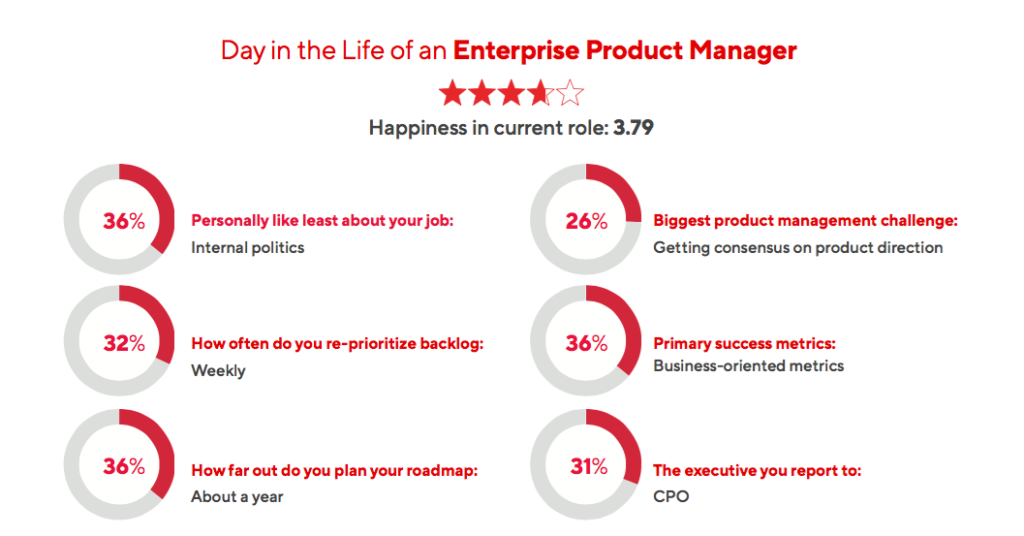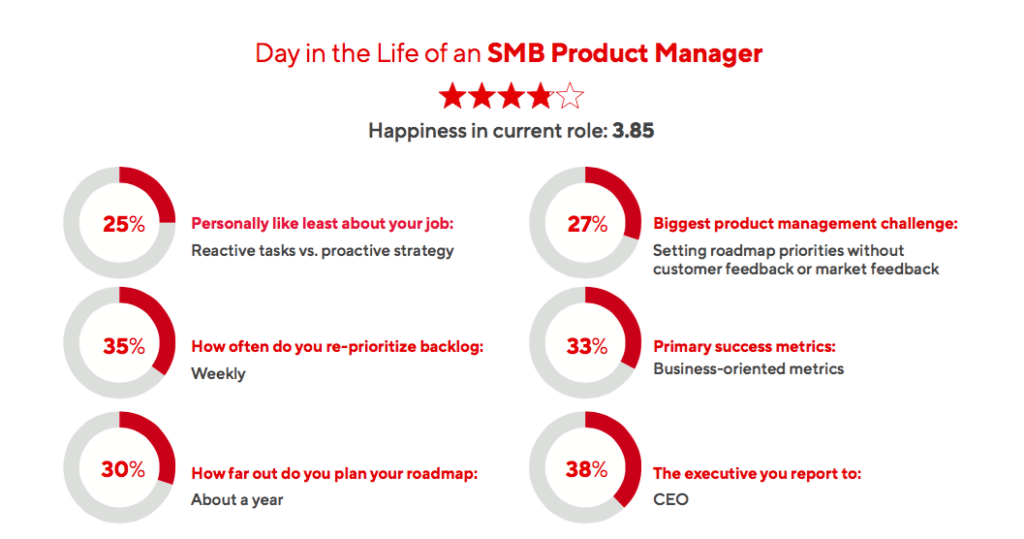Some organizations view product managers as strategic thinkers or product evangelists; while other companies treat the role as more tactical and expect their PMs to focus on overseeing the day-to-day development of the product. One factor that has a significant effect on how a business views its product managers is how large that business is. In this post, we’ll discuss the significant differences between working in product management at a small company versus a large one.
Note: The terms large company and small company are open to interpretation. For our purposes, we will define a large company as a business with more than 1,000 employees.
7 Differences Between Product Management in a Large vs. Small Company

1. What Will You Be Responsible for?
Employees of all types, across all departments, tend to have more responsibilities in smaller companies than in large ones. A smaller staff means everyone has to do more to keep the business running and growing. Product management is no exception.
The Small Company Product Manager
In a smaller organization, you will have more responsibilities as a product manager. You can expect to conduct research, define your user personas, and identify the problems worth solving for those personas. If your small company sells not just one product but a portfolio of products, you are also likely to be responsible for several or all of them.
You will also probably be responsible for the more tactical aspects of getting your products built — such as coordinating schedules with your development team and attending the daily development standup meetings. In a smaller company, you are less likely to have a product owner or project manager to own these tasks.
The Large Company Product Manager
Product managers at enterprises tend to have more specialized roles. You might be responsible for only one product, for example, as part of a team of product managers who each have a single product or product line.
If the company is large enough, you might be responsible for only one aspect of your product’s strategic direction or success. Amazon has many PMs working on Alexa, for example. That product might need a PM to oversee its speech-recognition software, another to oversee its search functionality, and still, others to manage the physical Alexa product, its built-in speaker technology, and other facets of the product.
2. Who Will Your Boss Be?
Another aspect of the PM role that differs in small and large companies lies in the reporting structure.
Small Company Product Management
If you take a product management job at a small company, you might be reporting directly to a senior executive. This person could be a vice president, chief operating officer, or even the chief executive officer.
To put this into concrete terms, in our latest industry survey of product professionals, we found that more than one-third of small company product managers — 38% — report directly to the company’s CEO.
Large Company Product Management
At a larger enterprise, you are likely to be joining a product team with its internal reporting structure. That means you might report to a director of product management, VP of product management, or a chief product officer.
Our industry report, “Product Managers in 2020,” found that 31% of large company PMs report to a chief product officer.

3. How Much Help Will You Have?
Smaller companies often give their product managers more freedom and autonomy, simply because these businesses don’t have the resources to build out a product team with its own hierarchy. The tradeoff, however, is that these small company PMs will have to handle more on their own.
Small Company Product Manager
At a small business, you will often have to take on the types of tasks that a project manager, researcher, and product owner would be responsible for in a larger company. You will need to coordinate with your development manager, for example, on the development team’s day-to-day responsibilities and resource levels.
Large Company Product Manager
Large companies typically have several roles designed to serve as tactical liaisons among the cross-functional team developing a product. As a PM in a big enterprise, for example, you will typically have a project manager to help you translate the high-level strategic objectives and plans in your product roadmap into a task list and schedule for the development of your products.
You might also have specialists on your team to help you with market research, analyzing usage data, and pulling together other details to help you build and update your product strategy.
![[Free report] 2021 State of Product Management ➜](https://no-cache.hubspot.com/cta/default/3434168/35d36a84-b157-43a1-acb7-b972dcb1d1ad.png)
4. What Types of Success Metrics Will You Focus On?
One area where product managers’ roles differ a great deal in small versus large businesses is in the types of success metrics, or key performance indicators (KPIs), they focus on.
Small Company Product Manager
Product managers in smaller businesses focus on a higher number of success metrics than their big-enterprise counterparts. A small company PM will be concerned, for example, both with user metrics (e.g., number of trial downloads and average time per session) and company metrics (e.g., revenue earned last quarter and average customer lifetime value).
Large Company Product Manager
Large company PMs will also track both business and customer-oriented success metrics. But because these PMs’ roles are more specialized, they will often focus more closely on specific user metrics. Let’s return to Amazon’s Alexa. The product manager responsible for Alexa’s search capabilities will need to focus on metrics such as the number of customer searches using the tool, the success rate of those searches, and the kinds of complaints users are submitting to the support team about search.
That PM will not be as focused on larger business metrics, such as how many Alexa devices are shipped or how much revenue the product generates per quarter. These company and revenue metrics are essential to all Amazon product managers — as they are to everyone in the company. But because Amazon is so giant, well-funded, and able to create such specialized roles, each PM can focus on a small number of KPIs related to their aspect of the product.
5. What Will Your Product Roadmap Look Like?
The roadmapping process also differs in several ways for PMs at small businesses versus those in large enterprises.
Small Company Product Manager
Smaller businesses tend to develop their product roadmaps with shorter time horizons. These companies are trying to grow their products’ market share and increase their brand profiles. With these goals in mind, the company will tend to focus on a few innovative or disruptive themes for its roadmap and to release new versions of its product more often than a large enterprise will.
Large Company Product Manager
When developing a product roadmap at a large enterprise, a PM will need to juggle several competing agendas. One such conflict is the desire to offer new solutions to the product’s user base, while also devoting time and resources to maintaining the product’s existing functionality. Updating a product at a big corporation also involves coordination among more teams and requires the approval of more people across the organization. For these reasons, large company PMs tend to develop roadmaps with longer time horizons. Learn more in our article, Why Product Roadmaps Look Different for Startups and Enterprises.
6. What Types of Challenges Will You Face?
As we found in our latest industry survey of product professionals, the most common challenges and frustrations also differ according to the size of a PM’s company.
Small Company Product Manager
Because PMs working in smaller companies don’t have large teams to help them, their challenges often relate to not being able to complete essential tasks. In our Product Managers in 2020 survey, we found that the biggest challenges facing PMs at small companies are “Setting roadmap priorities without customer feedback or market feedback.”
Large Company Product Manager
In a way, product managers in large companies face the opposite challenge of their smaller company counterparts. Their cross-functional teams are big, involving a lot of stakeholders across the company. Creating a shared strategic vision among all of these people can be difficult, which explains why our survey found the biggest challenge for large company PMs is, “Getting consensus on product direction.” Our study also found that large company product managers’ least favorite part of their job is “internal politics.”
7. What Skills Will You Need the Most?
Finally, the types of product management skills you’ll need will also differ from small companies to large ones.
Small Company Product Manager
At a small business, you’ll need to bring (or build) a wide range of PM skills. These will include the necessary hard skills for product management, such as proficiency in research, prioritization, and development. But you will also need to focus on soft skills such as becoming a great listener, a great communicator, and a persuasive leader. You will need to lead cross-functional teams that don’t report to you, after all.
Large Company Product Manager
A large company PM should have all of the skills of a small company PM as well. But at a large business, you are more likely to become hyper-focused. You’ll be responsible only for specific aspects of the product role. You’ll need to become an expert at research and analysis, or an expert on particular functionality, or an expert on a segment of your market. Learn more in our blog, Startup Skills That Can Work in Larger Companies.
Is it Better to Be a Product Manager in a Small or Large Company?
Although the product management role can differ a great deal depending on the size of the business, our research strongly suggests PMs at both large and small companies enjoy what they do. Among the thousands of PMs we surveyed for our 2020 report, we found PMs have a high average level of happiness: 3.8 out of 5.
Also, when we asked whether they hope to continue working as product managers in their next roles, 92% of our survey participants — working for companies of all sizes — said yes.
Related Terms: product portfolio management / roadmap / theme / user research / prioritization




